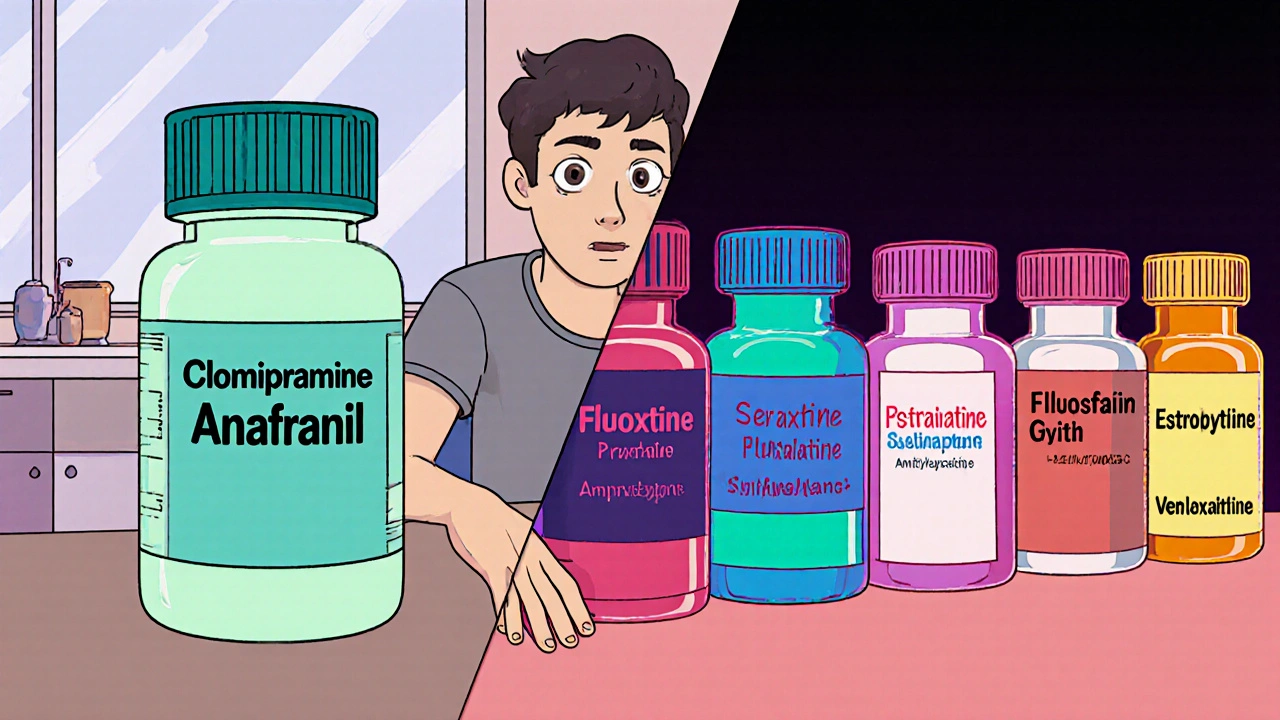Antidepressant Medication Selector
This tool helps you compare antidepressant medications for OCD and depression based on your priorities. Select your concerns and we'll show which medications best match your needs.
Select your top concerns
When you hear the name Clomipramine is a tricyclic antidepressant (TCA) primarily prescribed for obsessive‑compulsive disorder (OCD) and major depressive disorder (MDD). It’s sold under the brand name Anafranil and has been around since the 1970s. If you’re weighing it against newer drugs, you’ll want a clear picture of how it stacks up on efficacy, safety, cost, and convenience.
Why a direct comparison matters
Choosing a medication isn’t just about the headline "works for OCD" label. Physicians consider the drug’s mechanism, side‑effect profile, dosing flexibility, and how it interacts with other meds you might be taking. That’s why we break down the most common alternatives - the SSRIs and a few other TCAs - and line them up side by side.
Key players in the comparison
- Fluoxetine - an SSRI best known as Prozac, approved for depression, OCD, and bulimia.
- Sertraline - the SSRI sold as Zoloft, commonly used for OCD, PTSD, and anxiety.
- Paroxetine - Paxil, an SSRI with strong evidence for panic disorder and social anxiety.
- Escitalopram - Lexapro, a newer SSRI praised for tolerability.
- Amitriptyline - another older TCA, more often used for chronic pain and migraine prevention.
- Venlafaxine - a SNRI (serotonin‑norepinephrine reuptake inhibitor) that covers depression and anxiety.
How the drugs work: mechanism at a glance
Understanding the chemistry helps explain why side effects differ.
- Clomipramine: blocks reuptake of serotonin and norepinephrine, boosting both neurotransmitters. Its strong serotonin effect makes it especially effective for OCD.
- SSRIs (Fluoxetine, Sertraline, Paroxetine, Escitalopram): selectively inhibit serotonin reuptake, increasing serotonin levels while leaving norepinephrine largely untouched.
- Venlafaxine: inhibits both serotonin and norepinephrine but does so dose‑dependently - low doses act like an SSRI, higher doses add norepinephrine blockade.
- Amitriptyline: similar to Clomipramine as a TCA, but its antihistamine and anticholinergic actions are stronger, leading to more sedation and dry‑mouth complaints.
Side‑effect profile comparison
Side effects often decide who stays on a drug. Below is a quick rundown of the most frequent issues (rated mild, moderate, or severe based on typical clinical experience).
| Drug | Dry mouth | Weight change | Sexual dysfunction | Sleep impact | Cardiac risk |
|---|---|---|---|---|---|
| Clomipramine | Moderate | Weight gain (5‑10%) | High | Insomnia or sedation (dose‑dependent) | Elevated at >250 mg/day |
| Fluoxetine | Low | Weight loss (early) then stable | Moderate | Activating (may cause insomnia) | Low |
| Sertraline | Low | Neutral | Moderate | Generally neutral | Low |
| Paroxetine | Low | Weight gain (5‑7%) | High | Often sedating | Low |
| Escitalopram | Low | Neutral | Low‑moderate | Neutral | Low |
| Amitriptyline | High | Weight gain (10‑15%) | Moderate‑high | Strong sedation | Higher QT prolongation risk |
| Venlafaxine | Low | Neutral | Moderate | Insomnia common at high dose | Low‑moderate (BP rise possible) |
Effectiveness for OCD and depression
Clinical trials and real‑world data give us a rough ranking.
- Clomipramine: Historically the gold standard for OCD. Meta‑analyses show ~60‑70% response rate, often higher than first‑line SSRIs when doses are optimized.
- SSRIs (Fluoxetine, Sertraline, Paroxetine, Escitalopram): Effective for many patients, but average response hovers around 45‑55%. Some individuals need higher doses or a switch to a TCA.
- Venlafaxine: Works well for depression, moderate benefit for OCD-generally considered a second‑line option.
- Amitriptyline: Less data for OCD; better for pain and sleep, modest antidepressant effect.
Onset of action and dosing flexibility
How quickly you feel relief matters for adherence.
| Drug | Starting dose | Usual therapeutic range | Typical onset (weeks) |
|---|---|---|---|
| Clomipramine | 25 mg daily | 100‑250 mg/day | 4‑6 |
| Fluoxetine | 20 mg daily | 20‑60 mg/day | 2‑4 |
| Sertraline | 25 mg daily | 50‑200 mg/day | 2‑4 |
| Paroxetine | 10 mg daily | 20‑60 mg/day | 2‑4 |
| Escitalopram | 5 mg daily | 10‑20 mg/day | 2‑3 |
| Amitriptyline | 25 mg nightly | 75‑150 mg/day | 4‑6 |
| Venlafaxine | 37.5 mg daily | 75‑225 mg/day | 3‑5 |
Cost considerations in 2025
Price can swing wildly by insurance, pharmacy, and generic availability.
- Clomipramine: Generic available; average U.S. retail price around $0.45 per 10 mg tablet (~$15‑$20 for a month’s supply).
- Fluoxetine, Sertraline, Paroxetine, Escitalopram: All generic; typically $0.20‑$0.30 per tablet, making a 30‑day course $10‑$15.
- Amitriptyline: Cheap generic, $0.10‑$0.15 per tablet.
- Venlafaxine: Slightly higher, $0.30‑$0.40 per tablet.

When to choose Clomipramine over the alternatives
Think of Clomipramine as the specialist you call when first‑line options fall short. It shines if:
- You have severe, treatment‑resistant OCD and have already tried an SSRI at a therapeutic dose.
- Your doctor needs a medication that also lifts low mood because you have comorbid depression.
- You can tolerate the anticholinergic side‑effects (dry mouth, constipation) and have no significant heart rhythm issues.
- Cost is a concern but you have access to a generic version.
Scenarios where an SSRI or SNRI is a better fit
Most patients start with an SSRI because of the milder side‑effect profile.
- If you’re prone to weight gain or sexual dysfunction, Escitalopram often has the lowest rates.
- When insomnia is a major problem, Paroxetine’s sedating effect can be useful, while Fluoxetine’s energizing vibe can worsen sleep.
- For anyone with a history of cardiac arrhythmia, avoid high‑dose TCAs like Clomipramine and Amitriptyline.
- Venlafaxine works well when you need a dual boost for both depression and anxiety without the heavy anticholinergic load.
Practical tips for switching medications
Never stop a TCA cold turkey. Here’s a safe taper plan most clinicians follow:
- Reduce the current Clomipramine dose by 25 mg every 2‑3 weeks while monitoring for withdrawal symptoms.
- Introduce the new SSRI at a low dose (e.g., Fluoxetine 10 mg) once the TCA level is low enough to avoid serotonin syndrome.
- Maintain weekly check‑ins for the first month to adjust dosage and catch side‑effects early.
Always involve your prescriber - sudden changes can trigger serotonin syndrome, especially when mixing TCAs with SSRIs or SNRIs.
Bottom line checklist
- Clomipramine offers the strongest evidence for OCD but carries more side‑effects.
- SSRIs are first‑line for most patients due to safety and tolerability.
- Venlafaxine bridges the gap for mixed anxiety/depression cases.
- Cost differences are modest; insurance formularies often dictate choice.
- Discuss heart health, weight concerns, and sexual side‑effects with your doctor before deciding.
Can I take Clomipramine if I’m pregnant?
Clomipramine is classified as FDA pregnancy category C. That means risk cannot be ruled out. Doctors usually prefer an SSRI like Sertraline during pregnancy unless the benefit outweighs the risk.
How long do I need to stay on Clomipramine for OCD?
Most guidelines suggest a minimum of 12‑18 months of stable dosing after symptoms improve, to reduce relapse risk.
Is there a risk of weight gain with Clomipramine?
Yes. About 5‑10% of patients report noticeable weight gain, often linked to increased appetite and metabolic changes.
Can Clomipramine interact with over‑the‑counter sleep aids?
Combining it with antihistamines (e.g., diphenhydramine) can heighten sedation and anticholinergic effects. Always check with a pharmacist.
What should I do if I miss a dose of Clomipramine?
Take the missed tablet as soon as you remember, unless it’s close to the next scheduled dose. In that case, skip the missed one and continue with your regular schedule to avoid doubling.




Shannon Stoneburgh
October 25, 2025 AT 12:18Clomipramine’s side effects are just too much.
Amber Lintner
October 30, 2025 AT 02:25Oh, the drama of labeling a 70‑year‑old drug as “outdated”! Let’s be real: the SSRI crowd loves to brag about “clean” side‑effects while ignoring that many patients still suffer from residual OCD symptoms. Clomipramine may be a TCA, but it still crushes obsessions when the SSRIs give up. So before you write it off, remember that effectiveness sometimes trumps convenience.
Lennox Anoff
November 3, 2025 AT 17:31One must first acknowledge the prevailing orthodoxy that deems newer serotonergic agents as the default of clinical wisdom, a stance that, while appealingly minimalist, often neglects the nuanced pharmacodynamic tapestry that agents like clomipramine weave. It is not merely a relic of a bygone era; it is a molecule whose dual reuptake inhibition of serotonin and norepinephrine grants it a potency that, in the crucible of refractory obsessive‑compulsive disorder, frequently eclipses first‑line serotonergic monotherapy. Moreover, the empirical literature, replete with meta‑analyses, consistently cites response rates hovering between sixty and seventy percent for clomipramine, a statistic that remains conspicuously superior to the median forty‑five percent observed with many SSRIs. The pharmacological profile, however, is a double‑edged sword; the anticholinergic burden, manifested as dry mouth, constipation, and occasionally blurred vision, demands vigilant monitoring, particularly in patients with pre‑existing autonomic dysfunction. Yet to dismiss these side effects on the basis of aesthetic preference would be to sacrifice therapeutic efficacy on the altar of comfort. Cardiac considerations, especially the dose‑dependent QT prolongation, necessitate a baseline electrocardiogram and periodic reassessment when titrating beyond two hundred fifty milligrams per day. In parallel, the metabolic ramifications, including modest weight gain, must be weighed against the psychosocial toll of persistent OCD symptoms, which can be far more debilitating than a few extra pounds. The clinician’s role, therefore, evolves from a simplistic prescriptive model to a bespoke therapeutic partnership, wherein the benefits of clomipramine are calibrated against individual risk factors. In practice, a judicious tapering protocol-reducing the dose by twenty‑five milligrams every two to three weeks-mitigates withdrawal phenomena while preserving serotonergic balance. Transitioning to an SSRI, such as sertraline, should be orchestrated only after the plasma levels of the TCA have sufficiently waned to preclude serotonin syndrome. This sequential approach underscores a broader principle: that pharmacotherapy is not a binary choice but a continuum of strategic adjustments. Ultimately, the decision matrix must incorporate patient preference, comorbid conditions, and the relative severity of obsessive‑compulsive pathology, ensuring that clomipramine is neither unjustly vilified nor uncritically championed.
Olivia Harrison
November 8, 2025 AT 08:38That was a thorough read, Lennox. For anyone considering a switch, start by discussing your cardiac history with your prescriber-an ECG is a quick safeguard. If dry mouth becomes bothersome, sipping water regularly and chewing sugar‑free gum can help. Remember that the therapeutic onset for clomipramine is typically four to six weeks, so patience is key. And don’t forget regular follow‑ups; they’re essential for dose tweaks and monitoring side‑effects.
Bianca Larasati
November 12, 2025 AT 23:45Rise and shine, folks! If you’ve hit a wall with the usual SSRIs, clomipramine might just be the spark you need to reignite progress. Yes, it comes with a few quirks, but think of the payoff: the stubborn OCD thoughts finally start to loosen. Take it one step at a time, stay in touch with your doctor, and keep your eyes on the prize. You’ve got this, and the right med can make all the difference!
Corrine Johnson
November 17, 2025 AT 14:51Ah, the ever‑present allure of the dramatic “new‑age” fix; one must ask, is novelty truly synonymous with superiority?; clomipramine, despite its age, stands as a testament to pharmacological resilience-its efficacy, when parsed, reveals a pattern that newer agents merely imitate. Yet, dear readers, be warned: the allure of simplicity often masks a cascade of hidden costs, not the least of which is the insidious anticholinergic load that whispers through the night. Thus, before you hurl the ancient script aside, contemplate the balance between potency and side‑effect tapestry; the choice, after all, is a nuanced choreography, not a careless flick of the wrist.
Jennifer Stubbs
November 22, 2025 AT 05:58From an analytical standpoint, the data suggest that clomipramine’s higher response rate is offset by its broader side‑effect profile. When constructing a treatment plan, it makes sense to prioritize patient tolerance, especially for long‑term adherence. Cost differentials are modest, so financial considerations rarely tip the scale dramatically. However, the QT prolongation risk at doses above 250 mg/day is a legitimate concern for patients with cardiac histories. In sum, clomipramine is a strong candidate for treatment‑resistant cases, provided that monitoring protocols are in place.
Abhinav B.
November 26, 2025 AT 21:05Listen, the data is clear and you dont need to overcomplicate it-clomipramine works when SSRIs fail, period. If you have any cultural or religious concerns about meds, talk to your doctor; they can adjust the plan. Also, dont ignore the side‑effects, especially the heart stuff, but keep in mind that many people tolerate it fine. So be assertive, ask questions, and make sure you get the right dose for you.